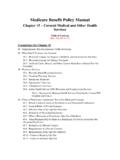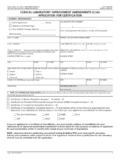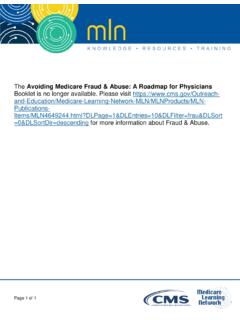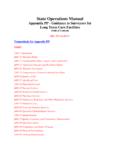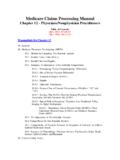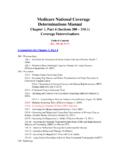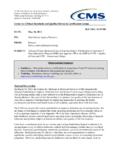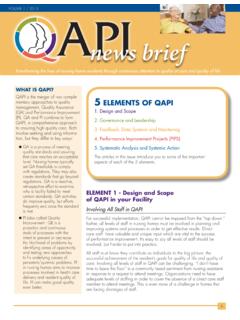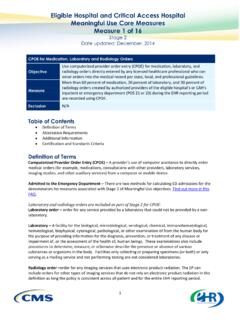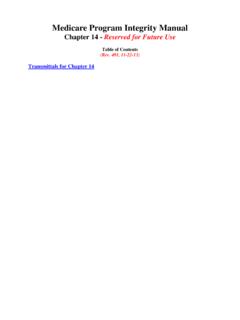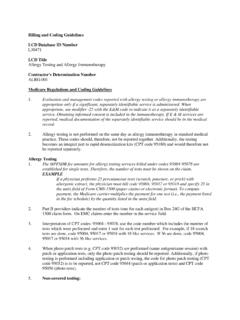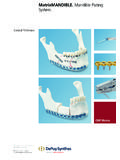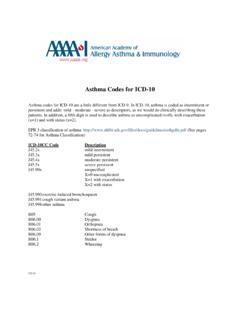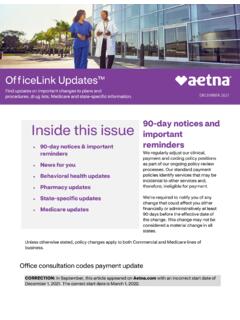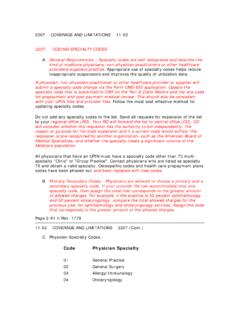Transcription of CMS Manual System
1 CMS Manual System Department of Health & Human Services (DHHS) Pub 100-04 Medicare Claims Processing Centers for Medicare & Medicaid Services (CMS) Transmittal 2997 Date: July 25, 2014 Change Request 8688 SUBJECT: Update to Pub. 100-04, Chapter 12 to Provide Language-Only Changes for Updating ICD-10 and ASC X12 I. SUMMARY OF CHANGES: This Change Request (CR) contains language-only changes for updating ICD-10 and ASC X12 language in Pub 100-04, Chapter 12. There are no new coverage policies, payment policies, or codes introduced in this transmittal. Specific policy changes and related business requirements have been announced previously in various communications. EFFECTIVE DATE: ICD-10: Upon Implementation of ICD-10; ASC X12: January 1, 2012 *Unless otherwise specified, the effective date is the date of service. IMPLEMENTATION DATE: ICD-10: Upon Implementation of ICD-10; ASC X12: August 25, 2014 Disclaimer for Manual changes only: The revision date and transmittal number apply only to red italicized material.
2 Any other material was previously published and remains unchanged. However, if this revision contains a table of contents, you will receive the new/revised information only, and not the entire table of contents. II. CHANGES IN Manual INSTRUCTIONS: (N/A if Manual is not updated) R=REVISED, N=NEW, D=DELETED-Only One Per Row. R/N/D CHAPTER / SECTION / SUBSECTION / TITLE R 12 Critical Care Visits and Neonatal Intensive Care (Codes 99291 99292) R 12 Billing Requirements for Global Surgeries R 12 Claims Review for Global Surgeries R 12 Adjudication of Claims for Global Surgeries R 12/200/ allergy Testing and Immunotherapy III. FUNDING: For Medicare Administrative Contractors (MACs): The Medicare Administrative Contractor is hereby advised that this constitutes technical direction as defined in your contract. CMS does not construe this as a change to the MAC statement of Work. The contractor is not obliged to incur costs in excess of the amounts allotted in your contract unless and until specifically authorized by the Contracting Officer.
3 If the contractor considers anything provided, as described above, to be outside the current scope of work, the contractor shall withhold performance on the part(s) in question and immediately notify the Contracting Officer, in writing or by e-mail, and request formal directions regarding continued performance requirements. IV. ATTACHMENTS: Business Requirements Manual Instruction Attachment - Business Requirements Pub. 100-04 Transmittal: 2997 Date: July 25, 2014 Change Request: 8688 SUBJECT: Update to Pub. 100-04, Chapter 12 to Provide Language-Only Changes for Updating ICD-10 and ASC X12 EFFECTIVE DATE: ICD-10: Upon Implementation of ICD-10; ASC X12: January 1, 2012 *Unless otherwise specified, the effective date is the date of service. IMPLEMENTATION DATE: ICD-10: Upon Implementation of ICD-10; ASC X12: August 25, 2014 I. GENERAL INFORMATION A. Background: This Change Request (CR) contains language-only changes for updating ICD-10 and ASC X12 language in Pub 100-04, Chapter 12.
4 B. Policy: There are no new coverage policies, payment policies, or codes introduced in this transmittal. Specific policy changes and related business requirements have been announced previously in various communications. II. BUSINESS REQUIREMENTS TABLE "Shall" denotes a mandatory requirement, and "should" denotes an optional requirement. Number Requirement Responsibility A/B MAC DME MAC Shared- System Maintainers Other A B HHH FISS MCS VMS CWF A/B MACs shall be aware of the updated language for ICD-10 and for ASC X12 in Chapter 12 of Pub. 100 - 04. X III. PROVIDER EDUCATION TABLE Number Requirement Responsibility A/B MAC DME MAC CEDI A B HHH None IV. SUPPORTING INFORMATION Section A: Recommendations and supporting information associated with listed requirements: N/A "Should" denotes a recommendation. X-Ref Requirement Number Recommendations or other supporting information: Section B: All other recommendations and supporting information: N/A V.
5 CONTACTS Pre-Implementation Contact(s): Post-Implementation Contact(s): Contact your Contracting Officer's Representative (COR) or Contractor Manager, as applicable. VI. FUNDING Section A: For Medicare Administrative Contractors (MACs): The Medicare Administrative Contractor is hereby advised that this constitutes technical direction as defined in your contract. CMS does not construe this as a change to the MAC Statement of Work. The contractor is not obligated to incur costs in excess of the amounts allotted in your contract unless and until specifically authorized by the Contracting Officer. If the contractor considers anything provided, as described above, to be outside the current scope of work, the contractor shall withhold performance on the part(s) in question and immediately notify the Contracting Officer, in writing or by e-mail, and request formal directions regarding continued performance requirements.
6 ATTACHMENTS: 0 Medicare Claims Processing Manual Chapter 12 - Physicians/Nonphysician Practitioners (Rev. 2997, 07-25-2014) - Critical Care Visits and Neonatal Intensive Care (Codes 99291 - 99292) (Rev. 2997, Issued: 07-25-14, Effective: Upon implementation of ICD-10; 01-01- 2012 - ASC X12, Implementation: 08-25-2014 - ASC X12; Upon Implementation of ICD-10) CRITICAL CARE SERVICES (CODES 99291-99292) A. Use of Critical Care Codes Pay for services reported with CPT codes 99291 and 99292 when all the criteria for critical care and critical care services are met. Critical care is defined as the direct delivery by a physician(s) medical care for a critically ill or critically injured patient. A critical illness or injury acutely impairs one or more vital organ systems such that there is a high probability of imminent or life threatening deterioration in the patient s condition.
7 Critical care involves high complexity decision making to assess, manipulate, and support vital System functions(s) to treat single or multiple vital organ System failure and/or to prevent further life threatening deterioration of the patient s condition. Examples of vital organ System failure include, but are not limited to: central nervous System failure, circulatory failure, shock, renal, hepatic, metabolic, and/or respiratory failure. Although critical care typically requires interpretation of multiple physiologic parameters and/or application of advanced technology(s), critical care may be provided in life threatening situations when these elements are not present. Providing medical care to a critically ill, injured, or post-operative patient qualifies as a critical care service only if both the illness or injury and the treatment being provided meet the above requirements. Critical care is usually, but not always, given in a critical care area such as a coronary care unit, intensive care unit, respiratory care unit, or the emergency department.
8 However, payment may be made for critical care services provided in any location as long as the care provided meets the definition of critical care. Consult the American Medical Association (AMA) CPT Manual for the applicable codes and guidance for critical care services provided to neonates, infants and children. B. Critical Care Services and Medical Necessity Critical care services must be medically necessary and reasonable. Services provided that do not meet critical care services or services provided for a patient who is not critically ill or injured in accordance with the above definitions and criteria but who happens to be in a critical care, intensive care, or other specialized care unit should be reported using another appropriate E/M code ( , subsequent hospital care, CPT codes 99231 - 99233). As described in Section A, critical care services encompass both treatment of vital organ failure and prevention of further life threatening deterioration of the patient s condition.
9 Therefore, although critical care may be delivered in a moment of crisis or upon being called to the patient s bedside emergently, this is not a requirement for providing critical care service. The treatment and management of the patient s condition, while not necessarily emergent, shall be required, based on the threat of imminent deterioration ( , the patient shall be critically ill or injured at the time of the physician s visit). Chronic Illness and Critical Care: Examples of patients whose medical condition may not warrant critical care services: 1. Daily management of a patient on chronic ventilator therapy does not meet the criteria for critical care unless the critical care is separately identifiable from the chronic long term management of the ventilator dependence. 2. Management of dialysis or care related to dialysis for a patient receiving ESRD hemodialysis does not meet the criteria for critical care unless the critical care is separately identifiable from the chronic long term management of the dialysis dependence (refer to Chapter 8, ).
10 When a separately identifiable condition ( , management of seizures or pericardial tamponade related to renal failure) is being managed, it may be billed as critical care if critical care requirements are met. Modifier 25 should be appended to the critical care code when applicable in this situation. Examples of patients whose medical condition may warrant critical care services: 1. An 81 year old male patient is admitted to the intensive care unit following abdominal aortic aneurysm resection. Two days after surgery he requires fluids and pressors to maintain adequate perfusion and arterial pressures. He remains ventilator dependent. 2. A 67 year old female patient is 3 days status post mitral valve repair. She develops petechiae, hypotension and hypoxia requiring respiratory and circulatory support. 3. A 70 year old admitted for right lower lobe pneumococcal pneumonia with a history of COPD becomes hypoxic and hypotensive 2 days after admission.
